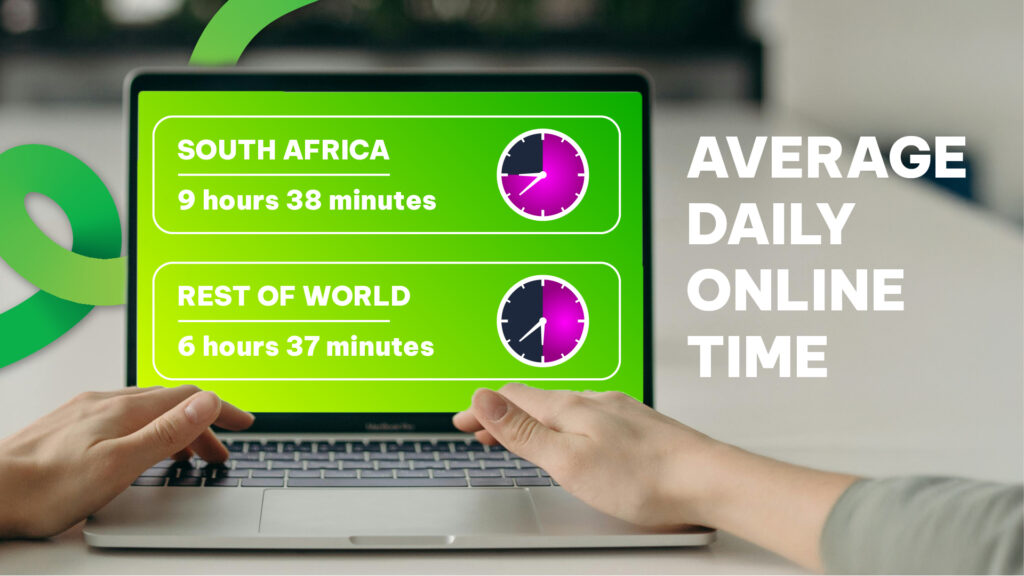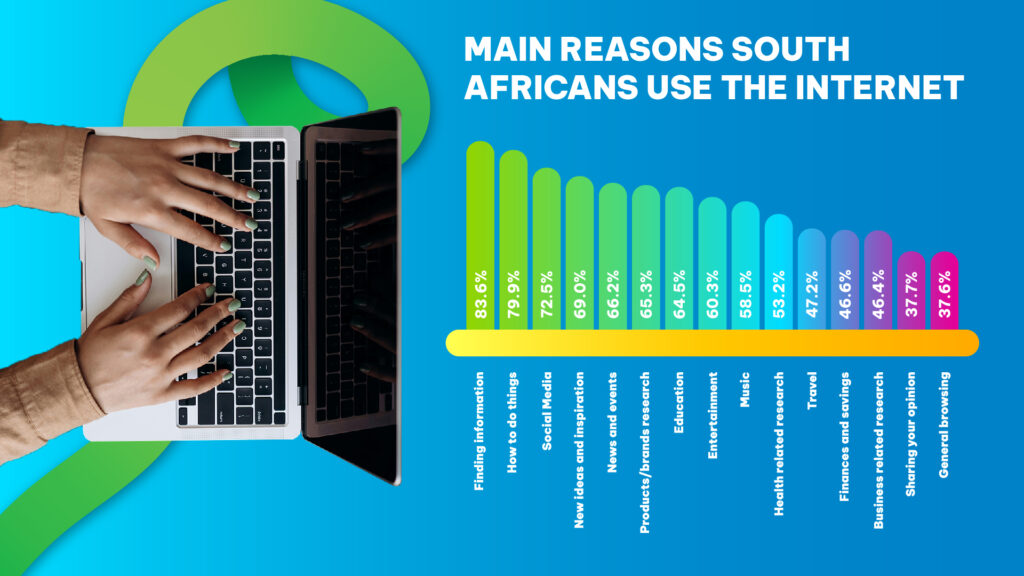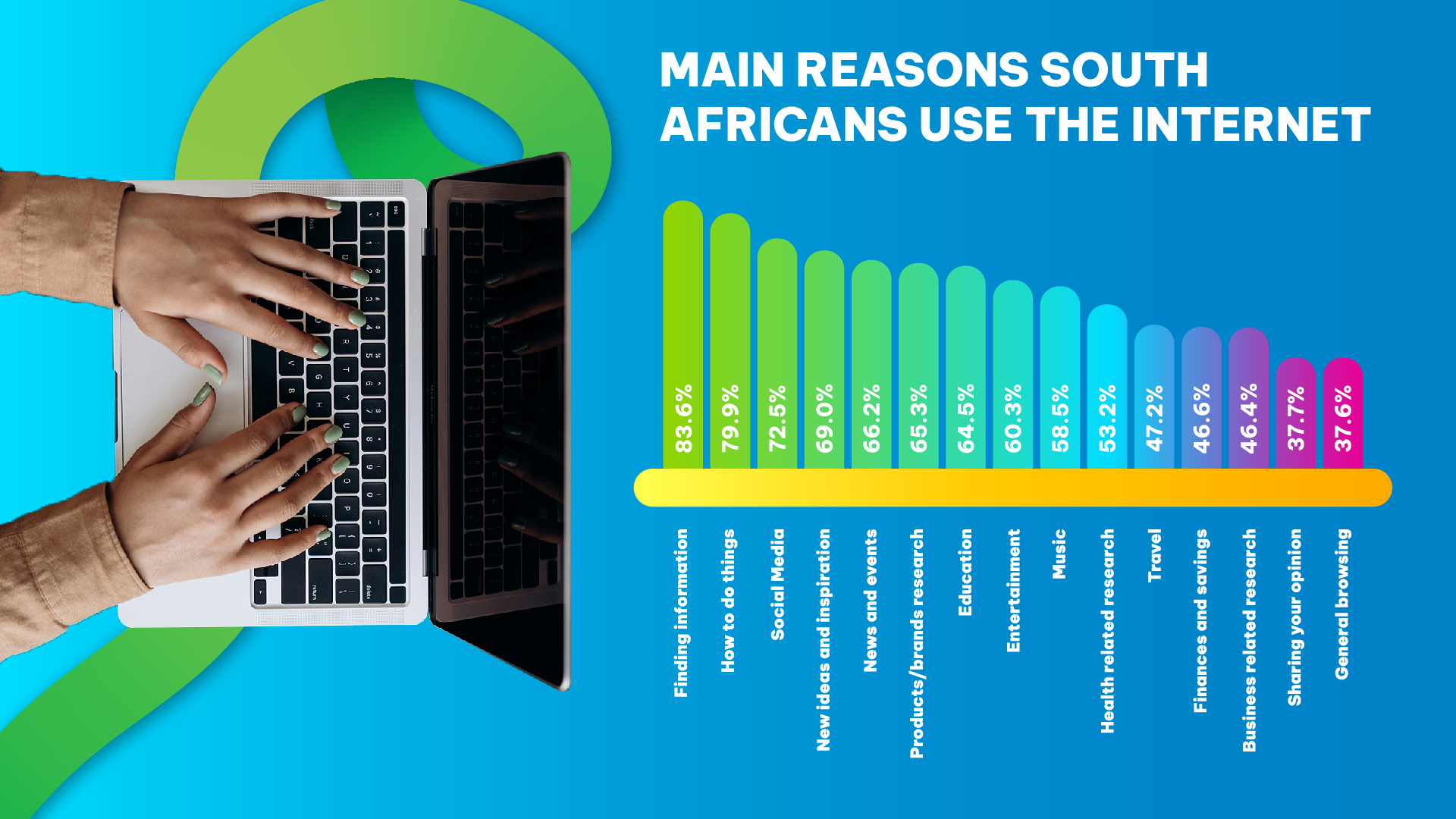‘The most connected nation on earth’
South Africans are famous for quite a few things. To name just a few, we’ve made headlines over the years because of how hard we work; our world-beating Springboks; a deep-rooted love of braaivleis / shisanyama and biltong; our beautiful blonde Benoni exports named Charlize and Charlene; Nelson Mandela (and his famous shirts); and milk tart, which was recently the subject of a social media uproar when retail businesswoman Martha Stewart presented it as something that Americans call ‘desperation pie’ (we think NOT).
But did you also know that, as a nation, we apparently spend more time on the Internet than any other country world-wide? You could say that we are the most connected nation on earth. So here at Vox, your Internet Service Provider (ISP) of choice, we thought it was worth taking a look at how South Africans use their Internet time.
What do we do online all day?
Connection, Connection, Connection
According to the Digital 2023 Global Overview Report – produced by data reference library DataReportal, online media monitoring company Meltwater and global creative agency We Are Social – South Africans top the global list for spending the longest time online compared to any other country (please do note that we’re talking about people of working age here – not children).
The report states that we’re connected, on any device, for an average of nine hours and 38 minutes daily. This is compared to the global average Internet user spending six hours and 37 minutes per day, according to the same source – which is three hours less.

This is interesting – but it surely isn’t all social media and browsing? What about work?
Fortune.com, discussing the same report, endorses this, saying: “If you work a desk job, even from home, you’re likely in front of a computer screen for at least eight hours a day… In the evenings, perhaps you work out via an app on your smart TV, stream a show on your tablet, play on your gaming console, video chat with a loved one, or dive into a new book on your e-reader. It may be simpler to add up the hours you aren’t tied to the internet.”
In short, instantly equating ‘time on the Internet = social media addiction’ is the wrong conclusion to jump to automatically. The fact is, we live in a digital world – meaning that a tremendous amount of our online time today is for work as well as leisure.
Let’s break it down further.
Details Reveal the Bigger Picture
More than 66 percent of all the people on Earth now use the Internet, with the latest data putting the global user total at 5.35 billion people. In South Africa, our 2024 Internet statistics looked like this:
-
- 45.34 million people use the internet (74.7 percent of the population); and
- 26 million people use social media (42.8 percent of the population).
Here’s a detailed breakdown of the main reasons why South Africans use the Internet regularly.

Interestingly, it can be seen that ‘General browsing’ comes in the lowest place on the table, with ‘Finding information’ and ‘How to do things’ taking the top two spots. This strongly suggests that even though South Africans are in top place globally for our Internet usage, we aren’t using it just to waste time.
Also, being a sociable nation, the third spot is taken up by ‘Staying in touch with friends and family’ (indicated as ‘social media’ for short on the graph), while ‘Education’ comes in seventh out of the 15 categories.
-
- A quick note on SA’s social media use: 2023 saw some 200,000 new users join social media locally, taking the total number of SA social media users to 26 million (as outlined above). The gender split is very balanced (49.8 percent female, 50.2 percent male), and the average number of platforms per user sits at just under eight.
When You Do Need to Control Online Time
As much as analysis of the graphic above supports the general global opinion that South Africans are hard workers, there are still times when individuals and families want to know that they’re in charge of their Internet usage.
Parental control can be very necessary when your children are younger, to help them explore the internet safely and protect them from inappropriate content. Norton, a leader in cyber safety, is second to none when it comes to ensuring your family’s safety and ensuring the online well-being of minors.

Vox offers a number of Norton packages, providing online safety and device protection for the whole family. Its extensive Parental Control features allow you to monitor, track and watch your child’s online behaviour, set limits for how much time they spend online, and block inappropriate content.
As for adults, practising ‘digital mindfulness’ can be one method of self-monitoring your internet browsing if excessive time online is causing you stress. Digital mindfulness involves understanding the way we interact online, ensuring that today’s technologies serve us as the useful tools that they are, but don’t control our lives.
Life Enhancing Technology
At Vox, we believe that it’s important to be aware of our technology patterns, but also not to panic about the time we spend online, unless this begins to have a negative impact on your life (or your children).
We are all essentially adjusting to a new world order in which technology is intrinsically bound up in our daily lives as never before. The key is adjusting with sufficient checks and balances built in – and as outlined above, we can help you to implement guidelines for your children, which helps them to learn the necessary skills to navigate their online world going forward.
And finally, on a less serious note: Let’s also not forget that if it wasn’t for the Internet, South Africans would never have known about that time someone else outrageously tried to claim our beloved melktert – let alone been able to raise our voices in protest!
Here’s to great Internet connectivity, and rewarding – although mindful – use of this life-enhancing technology. And remember that Vox is always ready with a solution, across the country, and able to cater to your own unique connectivity requirements.

Happy online working, leisure time, browsing, studying, gaming, shopping, researching, banking and communicating!














